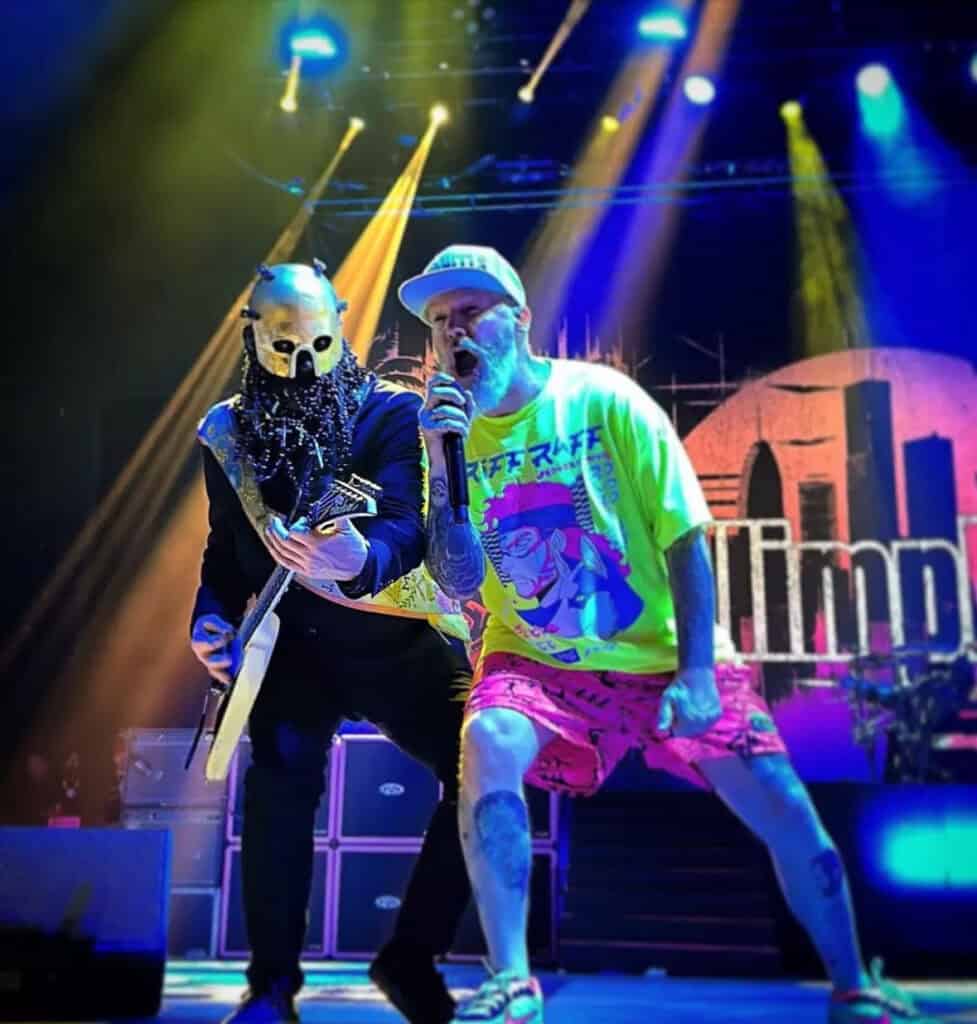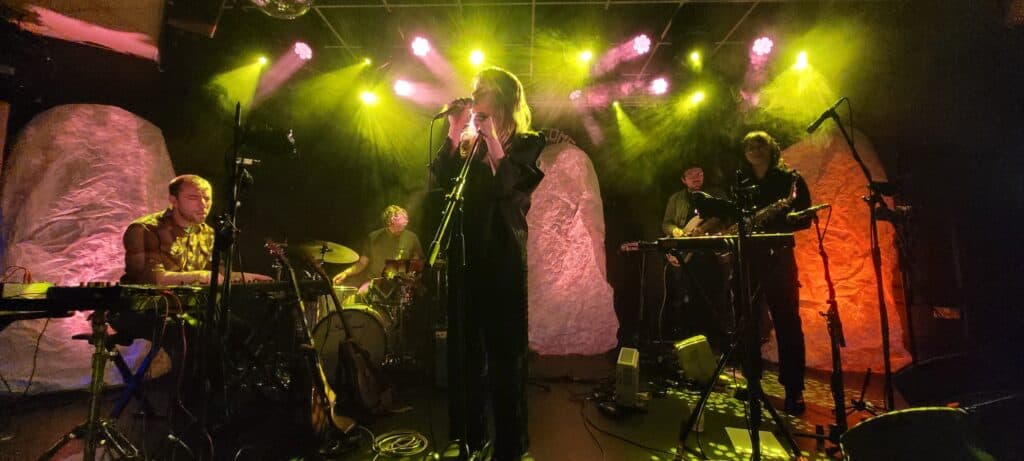Words: Callie Petch
Technically, tonight’s show is a downgrade. When Squid first announced their UK tour for sophomore album O Monolith earlier this year, the Leeds venue picked was the O2 Academy; the premiere mid-tier space for the city with a 2,000-person capacity for artists right on the verge of blowing up (or longstanding cult heroes). At some point in the month leading up to the date, however, the location shifted to the recently-opened Project House; the big new collaborative space between Leeds’ top indie promoters Brudenell Social Club & Super Friendz, and skate shop Welcome with a 1,000-person capacity. And yet, it doesn’t feel like a downgrade. To be brutally honest, I tolerate the O2 Academy more than I enjoy being there. There’s precious little character or atmosphere, parking prices nearby take the piss, and the sound can often be mush (especially for the vocals).
Stepping into Project House initially feels weird. It’s a converted tile warehouse and the designers have gone for an open plan minimalism, with the stage in the far-left from the entrance and the bar segregated to the right-half of the layout, which feels stark when you’re one of the first through the door and there’s only about 30 other people milling around. But, as the night goes on and the crowd on a relatively chilly Tuesday night begins to significantly thicken up, the design makes more sense. Fans cluster together but nobody feels squished in since there’s all the space off to the side, the lower ceilings add an intimacy which you can’t get at the Academy, and the sound (at least to my ears aside from some mumbled vocals) is dynamic and clear throughout. Fittingly, it makes me think more than a bit of the beloved Brudenell, albeit with the slight knock that the floor having no appreciable elevation changes means you can be properly stuffed for a view should you get stuck behind a tall bastard or turn up late.
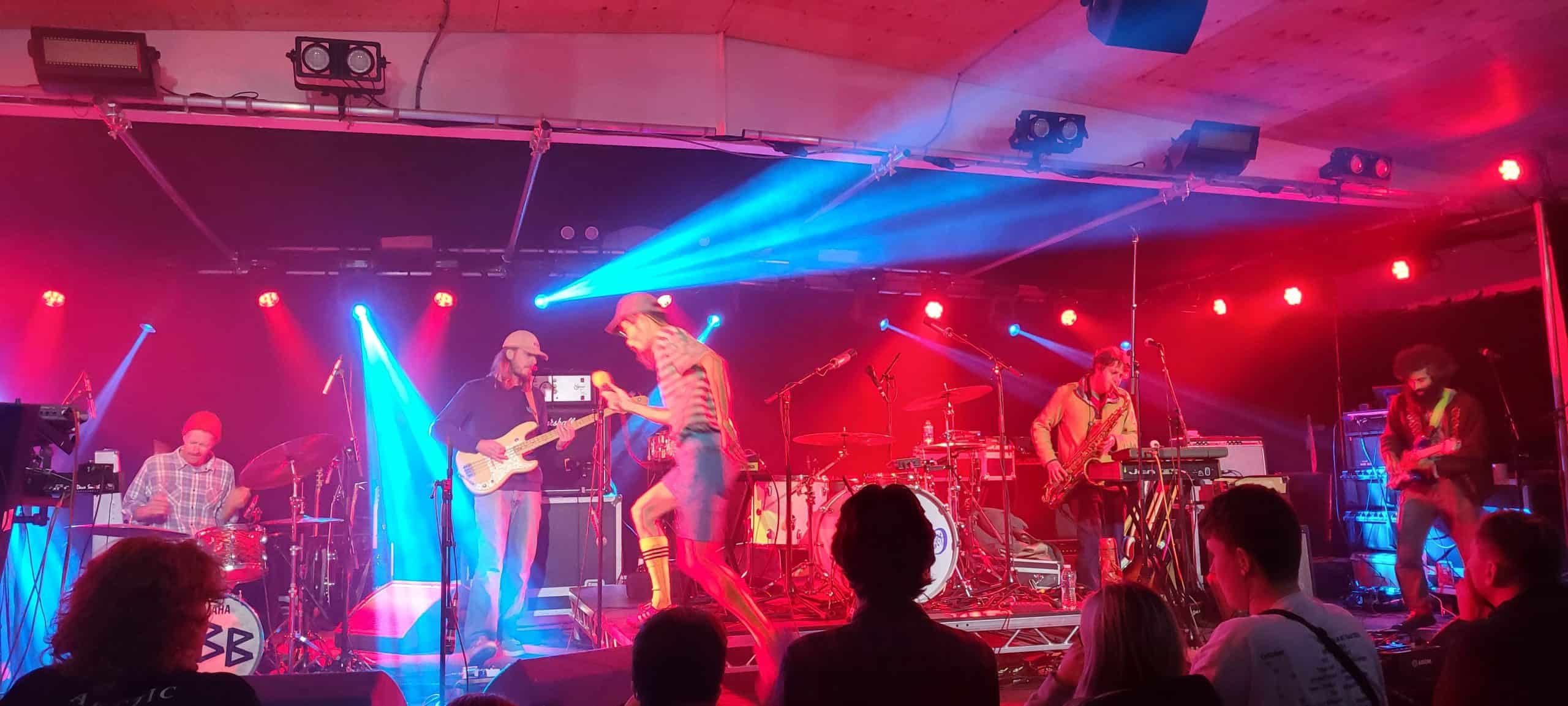
Photo by Callie Petch.
It also feels like a more befitting place for this evening’s line-up to be playing. Christ, imagine Ichigo Evil playing at the Academy?! Riding an immensely fine line between performance art, experimental rock, and straight-up troll-job, this team-up between Bristol-based The Evil Usses and Japanese performer Ichi begins with a five-minute stretch where the band play a beatless one-note drone whilst Ichi does a series of yoga poses in front of Squid’s drumkit. The trance-like monotony eventually gets broken by a hardcore thrash with Ichi screeching nonsense vocalisations into his microphone which lasts almost exactly ten seconds before cutting out. Much of their opening set is like this.
Some songs – and I think I am really stretching the definition of the term “songs” here – lock into a prog groove and defiantly refuse to change whilst Ichi yells “nee-naw” like a child. Other songs have the unstructured chaos of an improv session gone horribly wrong, like every musician on-stage is playing something entirely different to everyone else. Other songs sit in near-silence for minutes as Ichi, taking a break from relentlessly pacing back and forth across the stage like a man who keeps entering and exiting a room because he’s forgotten to do something but can’t remember what, pendulum swings his microphone in between the pit separating the stage and the crowd barriers.
Likely obvious, this is all well out of my pay grade. There’s only so deep into The Quietus I can get before the poptimist in me who craves structure, hooks, and emotion in their music starts reflexively doing a jerk-off motion whilst rolling their eyes. And yet, I do respect what Ichigo Evil are doing, if for nothing else than it being an experience of the kind I rarely get to see and a genuine weirdness that much of the current try-hard art-rock sect could only dream of being. Perhaps unsurprisingly, the crowd response oscillates between ‘bemused transfixion’ and ‘talking so loudly that they overpower a lot of the noise coming off stage,’ but that’s the risk which comes when playing music like this to the non-devoted expecting something more in line with Black Country, New Road.
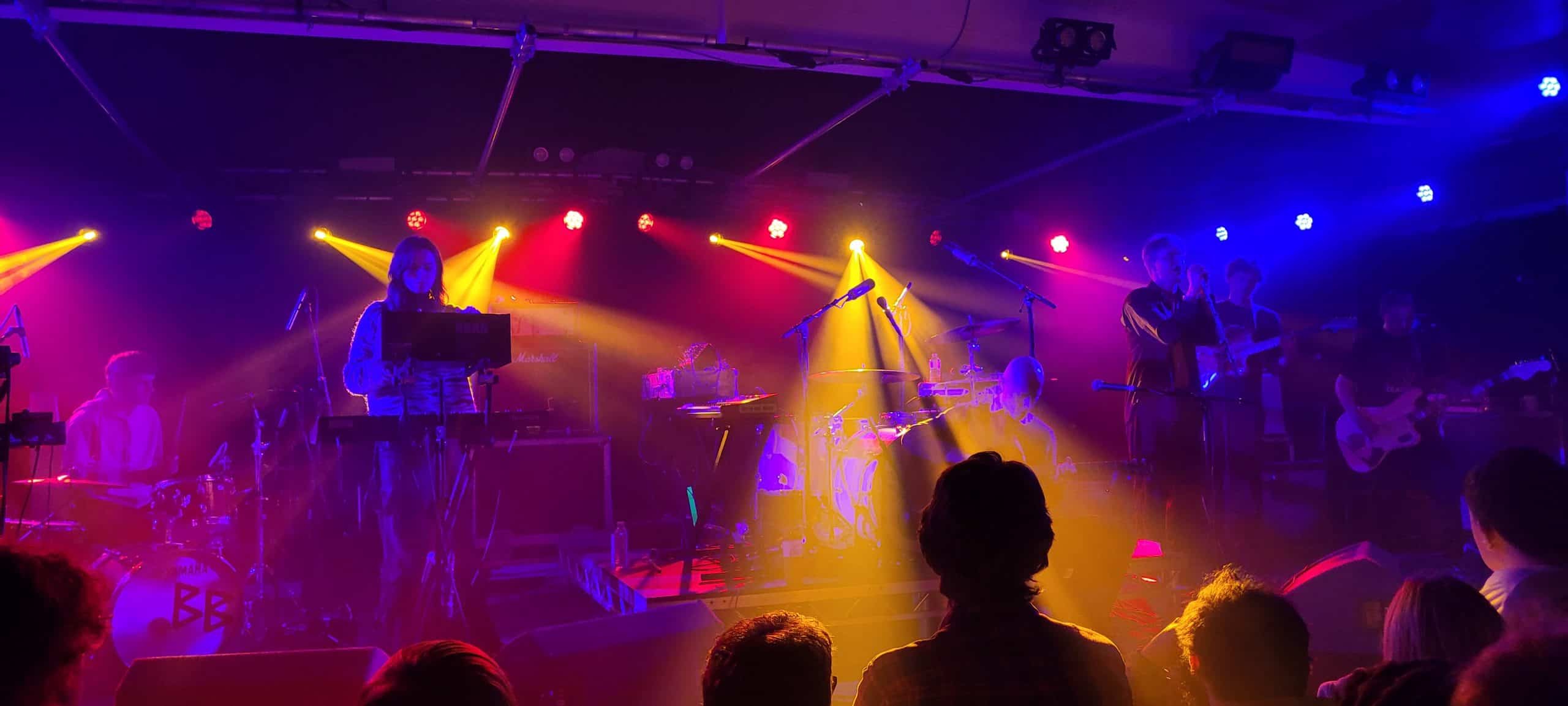
Photo by Callie Petch.
That particular RIYL brief is filled with gumption by second support Blue Bendy. A South London sextet who, and this is me being generous, give off real ‘we have Black Country at home’ vibes from the instant their set kicks off. Sprawling, technically-proficient art-pop songs that shift on a dime with uncommon time signatures, contrapuntal instrument dynamics, and a talk-singing vocalist who treats rhythm and rhyme like optional extras in a car in between random yelling. If Live at Bush Hall was dearly missing that Isaac Wood-ness for you, here come Blue Bendy to fill your gap. For me, I’ve (miraculously) turned a corner on BC,NR ever since Wood left and that collective completed their shift into ‘the new Arcade Fire’ following three whole years of my just being very annoyed by their schtick. So, yeah, Blue Bendy: not for me, although I am relieved to hear proper songs again after spending half of Ichigo Evil’s set wondering when music was gonna occur. The band members, some of which originally hail from Leeds, have more than a few of their parents in the crowd taking photos/video and generally being proud in the face of audible indifference – somehow the crowd-chat is louder than during Ichigo Evil – which is at least sweet.
To Squid. Whilst I loved their 2021 debut Bright Green Field, this year’s O Monolith was a major step back which far too often fell into uninspired background noise somewhat indistinguishable from their scene-mates I don’t care for. Yet, seeing the band on this tour was one of my goals for the year – enough to push through post-London Film Festival fatigue to make the Leeds date. One of the biggest virtues proponents of the so-monikered Windmill Scene spout is how its acts are so much better live. The grooves have an extra kick, the intensity gets dialled up a notch, the thrills and the tension are amplified, and all of these songs just come alive more from watching a locked-in unit create and alter them in front of your eyes and ears, feeding off a symbiotic energy. Were this to be the case, I was hopeful that O Monolith would click together from hearing its cuts in a live context.
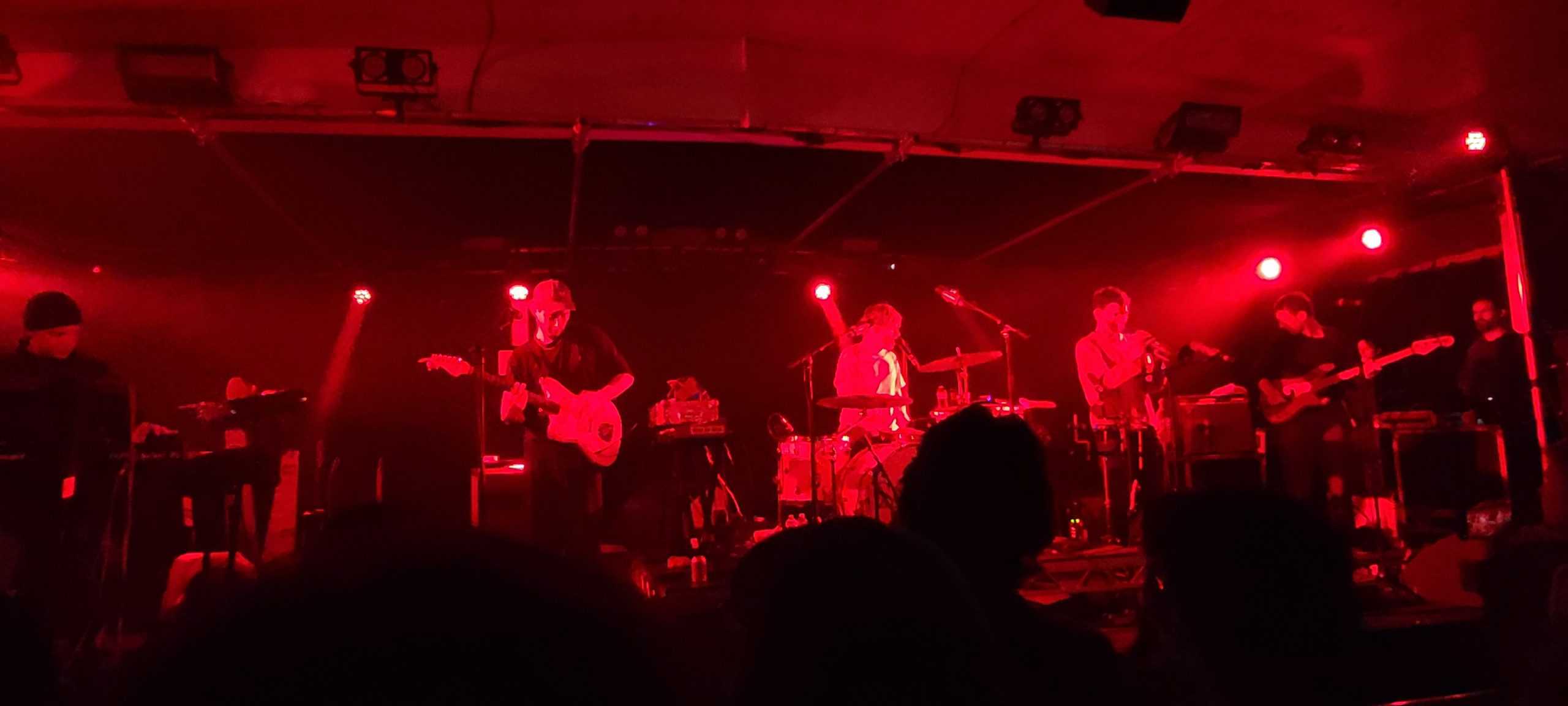
Photo by Callie Petch.
Initially, these assertions are very much founded. Taking the stage to a looping track of shattered glass, the quartet gradually overdub and manipulate its circular time signature with a variety of synths and modulars until the familiar arpeggios of lead single “Swing (In a Dream)” crest into view. What was already the album’s high watermark gains an additional viscera from punchy live sound mixing which swirls inside a maelstrom rather than keeping the listener at a slight remove. The song’s climax even gets a moshpit going, the first of many throughout the evening. Second single, and Monolith’s other bright spot, “Undergrowth” immediately follows and its deep bass groove – first on a synth, later on an actual bass by Laurie Nankivell – reveals a swagger not quite displayed on-record which further sells the descent into apocalyptic anxiety by the track’s end. Whilst less cluttered than the recorded take, its climax is still powerful and sees nearly every band member swap instruments to pull it off – Laurie moves to horns, guitarists Anton Pearson and Louis Borlase hunch over their synths, and Arthur Leadbetter deploys his electric cello for the first time.
It’s all highly impressive musicianship to pull off, but it also hits firmly in the gut. To some degree, it’s reminiscent of a good live dance music set. The way that Squid are able to control the flow of these songs, building to drops which release right on the precipice of becoming static, which unleash a flood of dopamine and feeling, guiding between likeminded songs or soundscapes on a genuine journey. As if to drive the comparison home, “Undergrowth” is almost seamlessly transitioned into “G.S.K.” by way of an instrumental jam that evinces a bright future if the band wanted to pivot to making IDM throwbacks instead. All of this has undoubtedly been meticulously rehearsed, but Squid also demonstrate an ability to respond to the crowd when called for, again much like a great DJ, as when a giant pit opens up during the slower outro of “G.S.K.” and drummer-vocalist Ollie Judge changes the lyrics to “we’re slow-dancing in the moshpit” to temper crowd expectations without killing the vibe.
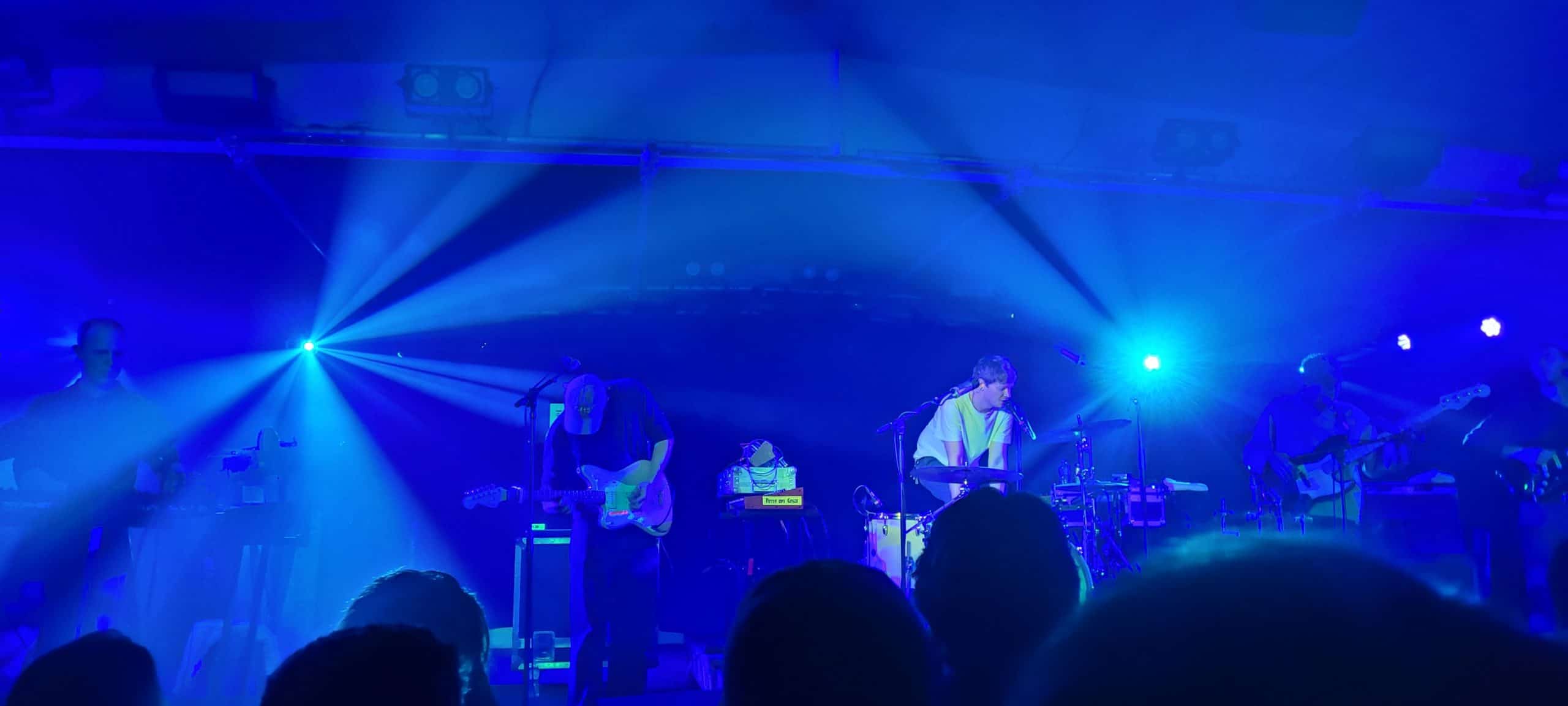
Photo by Callie Petch.
A near-perfect start, but then the night runs into the hitch I was both fearing and expecting: this is an O Monolith tour, so they have to play the other tracks from O Monolith which aren’t anywhere near as good. And, unfortunately, a live context only makes the amount in which they pale to Bright Green Field even more apparent. Much of Monolith was born out of live jam sessions, particularly the seated tour Squid embarked upon in the immediate aftermath of Field’s release as COVID restrictions were beginning to lift, and the underwritten nature of many of those songs comes full bear on-stage. “Devil’s Den” benefits from being freed of Monolith’s bizarrely-flat mix, but still aborts right when it seems to get going. “After the Flash” meanders about to a degree which begins to kill the energy of the crowd and never provides a payoff to justify it. “If You Had Seen the Bull’s Swimming Attempts…” meanwhile, shifts through its disparate movements like a truck driver who can’t stop leaving his gear-stick in neutral on every change; few tracks feel more like stapled-together jam session remnants than this.
The desire to add more texture and subtler soundscapes is applaudable, but all too often these come at the expense of depth and the band’s strengths at communicating emotional narrative. I’m not the only one who feels this way. During the set’s middle stretch, where most of the Monolith material is situated, singalongs and pits and general engagement taper off from the white-hot opening, and the decision to stretch out the mid-song ambient break in Field highlight “Documentary Filmmaker” well over double its original length has whatever spell it is aiming to conjure broken by mass crowd conversation. Admittedly, some of that may simply be the result of this crowd being the kind of rowdy which wants to create moshpits all the damn time regardless of whether the song has any more suitable such moments or not. But it is representative of a band’s new material not fully connecting, particularly since the infrequent jam transitions between tracks, which do have the dynamics and progression and flow lacking in much of Monolith, don’t lose the crowd anywhere near as much.
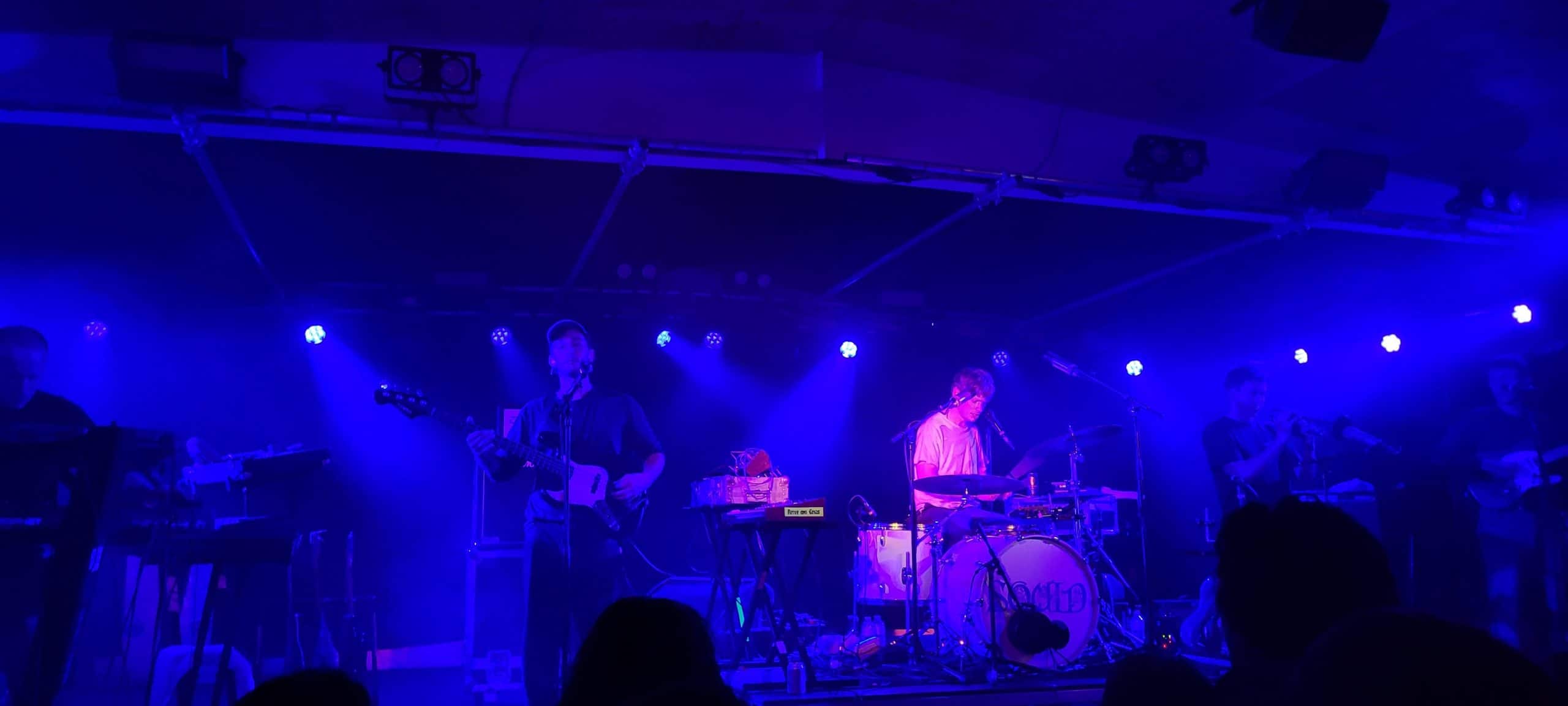
Photo by Callie Petch.
That said, when the night is on, it is on. “Peel St.” provides a much-needed pick-me-up during the mid-set lull, with the moment where the time signature and tempo properly lock in still being as electrifying as the first time I heard it. “Paddling” wisely opts to forgo the entire slow-burn to instead drop everyone in medias res to the live drum portion, as well as letting the other band members take a turn at lead vocals. And whilst “Pamphlets” may not have been aired this time – “not tonight,” Ollie responds to an early request for it – “Narrator” is a barnstormer of a curtain call. Even without Martha Skye Murphy around to provide the guttural wails of the studio take, it has all the same nagging intensity and patient overloading build which gives way to a cascading rush of machine gun drums, squealing modular synths, and crunching guitars. The last moshpit of the night gets bigger and bigger and bigger as the track progresses, like a maw threatening to ceaselessly expand and consume the entire floor, and the whole show reaches a glorious crescendo when it all collapses.
Except that “Narrator” isn’t the last song of the night. “The Blades” is and, whilst it makes a certain narrative sense – the last few minutes going completely beatless, allowing Ollie to emerge from behind the kit for the first time, microphone in hand, to croon and animatedly contort both body and face as an unencumbered frontman – it can’t help but provide a muted end to the evening’s energy. Where “Narrator” is a full-tilt berserk charge of a track, riding an emotional and intense progression to multiple cathartic firework displays, “The Blades” intentionally cuts its (honestly underwhelming) build off at the knees and shuffles around for the remaining few minutes denying any catharsis. The raucous cheers which greeted the end of “Narrator” are decidedly more polite and deflated when Oli finally finishes his acapella ending to “The Blades” with a gameshow host-esque “thank you very much” spin-and-point. Nobody’s upset, per se, but the “one more song” chants that ensue as the house lights come up due to curfew have a sensation of wanting a more satisfying send-off than the one provided.
Kind of a mixed night, then. But whilst the show doesn’t manage to reverse my downbeat opinion on O Monolith like I’d hoped, it does manage to keep my faith in Squid alive for the time being. When the material gives them that base to work from, they are an incendiary live act capable of commanding the attention like few of their peers can. Hopefully LP3 sees them bottle some of that energy back into their songwriting.

![Live Review: Squid – Project House, Leeds [17th October 2023]](https://www.soundspheremag.com/wp-content/migration/images/stories/Squid-2023.jpg)



